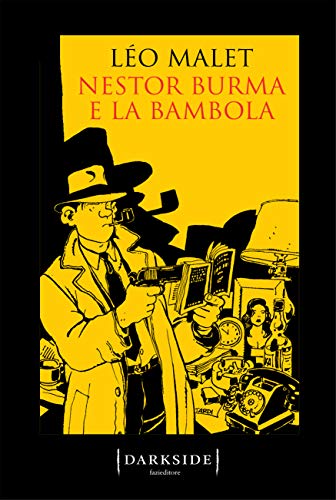
Part of Series
Cosa ci fa Nestor Burma in uno studio cinematografico, tra le mani di un truccatore russo che riesce a rendere il suo volto irriconoscibile? Sta lavorando, ha bisogno di celare la sua identità per poter sorvegliare e proteggere il suo cliente del momento, il noto attore Favereau, che ha ricevuto misteriose minacce di morte. Burma sospetta che la star del cinema abbia abusato fin troppo del suo fascino di tombeur de femmes, inimicandosi il padre di una ragazza sedotta e poi abbandonata, morta nel tentativo di abortire. Ma il nostro non avrà il tempo di verificare le sue intuizioni, perché l’attore muore improvvisamente sotto i suoi occhi. Il lavoro di sorveglianza, per cui Burma era stato assoldato, è stato interrotto da cause di forza maggiore, ma il detective parigino non può certo abbandonare la missione senza aver fatto deve trovare l’assassino, in una caccia serrata tra le insidie del set cinematografico, dove ogni oggetto potrebbe trasformarsi nell’arma di un delitto. Primo piano sul cadavere, finora inedito in Italia, mette in scena la primissima indagine di quello che diventerà il detective più geniale di gli affezionati potranno trovare un Burma alle prime armi e i nuovi lettori avranno un’ottima occasione per imparare a conoscere un protagonista inconfondibile del noir europeo. «Malet è, giustamente, ritenuto fra le voci più alte del noir francese». Giancarlo De Cataldo «Se non ci fossero i soliti, pigri confronti con cui vedersela – un giallista migliore di Simenon, l’adattamento francese di Chandler –, gusteremmo in pieno ogni pubblicazione di Léo Malet come l’irrompere dell’anticonformismo, schietto e irritante, su una scena dominata dai canoni della correttezza. A maggior ragione nel caso di un inedito». Roberto Iasoni, «Corriere della Sera»
Author

Léo Malet est né à Montpellier en 1909. Attiré par l'écriture et l'anarchie, il décide à l'âge de 16 ans de « monter » à Paris, ou pour survivre il effectue une multitude de petits métiers. En 1930, il fait la connaissance d'André Breton et découvre le surréalisme, dont il devient un familier. Après la guerre, Léo Malet rencontre Louis Chavance qui lui suggère d'écrire des romans policiers, un genre encore inexistant en France. Malet produit alors d'alertes contrefaçons de Hard boiled américains qu'il signe des pseudonymes de Frank Harding ou Léo Latimer. En 1943, il publie sous son véritable nom, 120 rue de la gare, un roman policier très français qui met en scène pour la première fois l'illustre Nestor Burma. C'est en 1953, lors d'une promenade, que Léo Malet aura l'idée de faire de son privé un nouveau « piéton de Paris ». Le soleil naît derrière le Louvre inaugure la série des Nouveaux Mystères de Paris, un an après. Chroniques réalistes de la vie des quartiers parisiens, Les Nouveaux Mystères de Paris donnent définitivement à son personnage ses lettres de noblesse. Avec 55 titres (dont 29 consacrés à Nestor Burma), Léo Malet a bien mérité des Lettres françaises. Il est mort en 1996. (source: Pocket.fr) +++++++++++++++++++++++++++ Leo Malet was born in Montpellier. He had little formal education and began work as a cabaret singer at "La Vache Enragee" in Montmartre, Paris in 1925. In the 1930s, he was closely aligned with the Surrealists, and was close friends with André Breton, René Magritte and Yves Tanguy, amongst others. During this time, he published several volumes of poetry. He died in Châtillon, a little town just south of Paris where he had lived for most of his life, four days before his 87th birthday. Though having dabbled in many genres, he is most famous for Nestor Burma, the anti-hero of Les Nouveaux Mystères de Paris. Burma, a cynical private detective, is an astute speaker of argot (French slang), an ex-Anarchist, a serial monogamist and an inveterate pipe smoker. Of the 33 novels detailing his adventures, eighteen take place in a sole arrondissement of Paris, in a sub-series of his exploits which Malet dubbed the "New Mysteries of Paris" quoting Eugene Sue's seminal "feuilleton"; though he never completed the full 20 arrondissements as he originally planned. Apart from the novels, five short stories were also published, bringing the total of Burma's adventures to 38. The comic artist Jacques Tardi adapted some of his books much to the author's approval claiming that he was the sole person to have visually understood his books; Tardi also provided cover illustrations for the Fleuve Noir editions of the novels, released from the 1980s onward.


